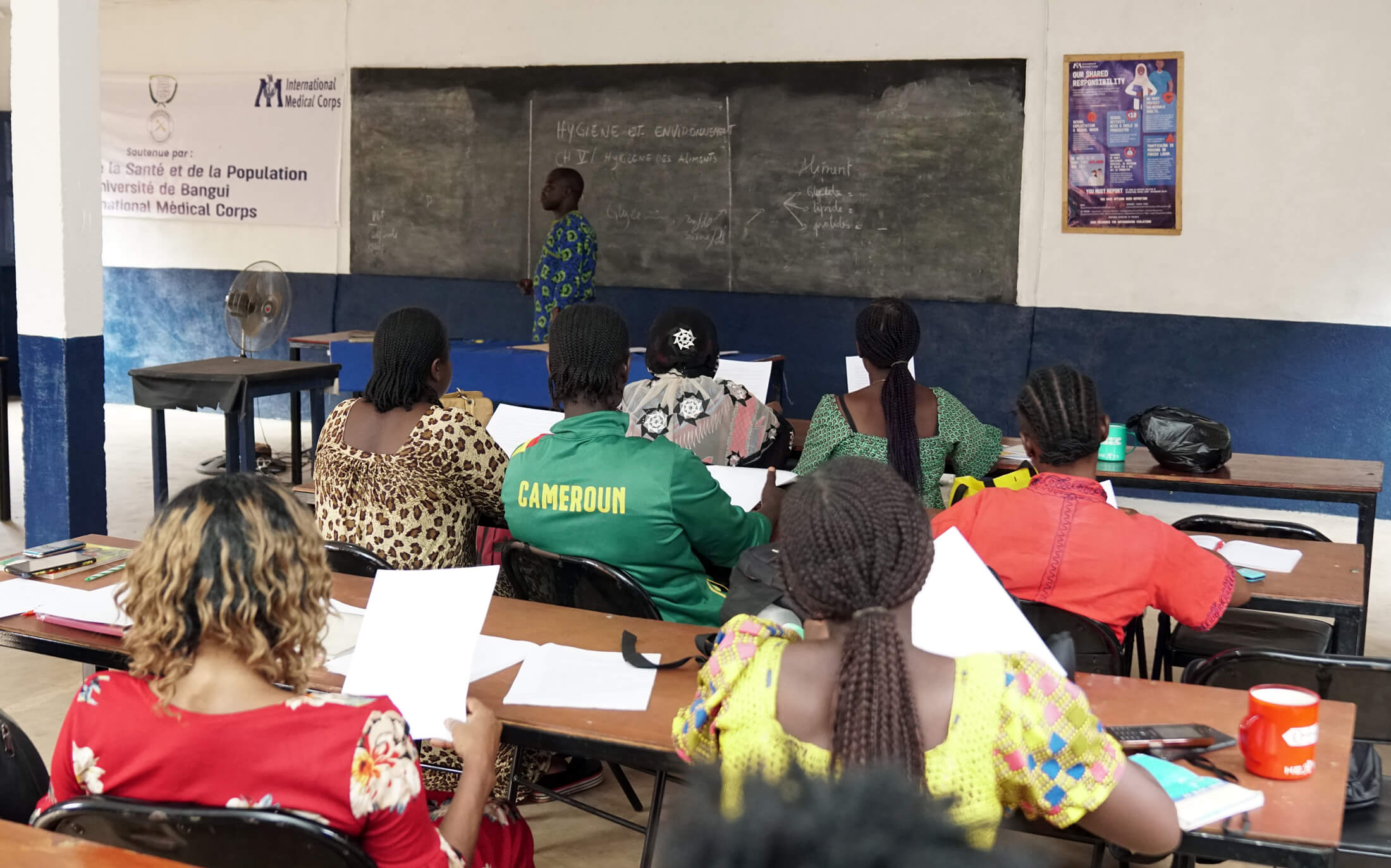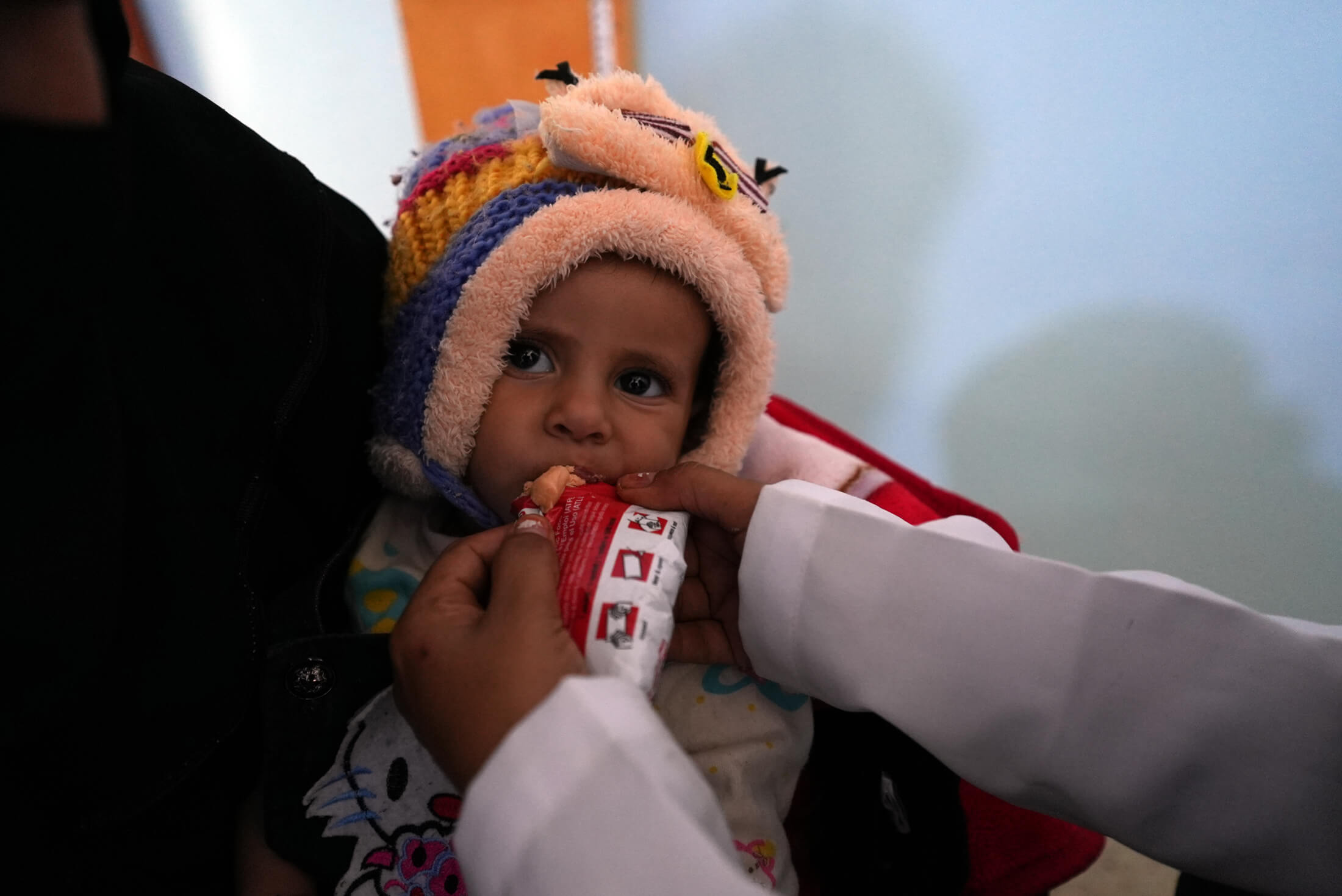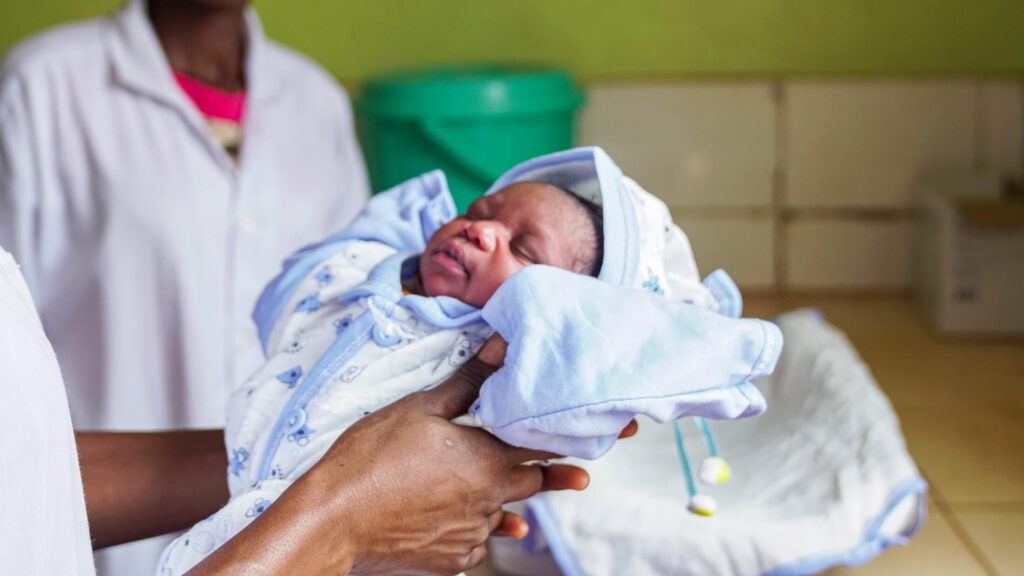Training Aspiring Midwives Assistants in CAR
In low-resource areas, midwives play a crucial role in saving lives during childbirth. Their skills and compassion significantly affect maternal and newborn health, meeting 90% of essential sexual, reproductive, maternal, newborn and adolescent healthcare needs. In the Central African Republic (CAR), the availability of these lifesaving services is critically low.


International Medical Corps is shaping the future of maternal healthcare in CAR by training midwifery assistants at the newly established Bria Annex Institute. Launched in partnership with CAR’s Ministries of Health and Higher Education, this programme addresses the critical shortage of skilled birth attendants, especially in rural areas. By focusing on culturally sensitive care and comprehensive training, the institute is poised to make a lasting impact on maternal and newborn health outcomes in CAR.

The inaugural class of 18 students has already logged hundreds of hours, mastering essential skills ranging from labour and delivery to postpartum and newborn care. With its sights set on reducing maternal and neonatal mortality, this programme is a vital step toward creating a healthier, more resilient future for communities nationwide.
Supporting People with Disabilities in Poland
The war in Ukraine has created one of the largest refugee crises in recent history, displacing millions of people—including people with disabilities (PwDs), who can face unique challenges in rebuilding their lives. In neighbouring Poland, where many Ukrainian refugees have sought safety, we’ve partnered with organisations like the Avalon Foundation to address these needs and promote inclusion for people with disabilities.



Through this collaboration, we’re helping to improve the lives of PwDs by providing assistive devices that support mobility, communication and independence. These devices enable recipients, whose lives have been disrupted by war and displacement, to regain a sense of normalcy and autonomy, empowering them to participate more fully in their communities. Our partnership also supports activities designed to build community between Ukrainian refugees and local residents in Polish host communities.


As the war continues to disrupt lives and infrastructure in Ukraine, we remain committed to bringing vital care to people in need. By focusing on both immediate needs and long-term resilience, we’re working to ensure that vulnerable communities have the tools and support they need to thrive.
Responding to Increased Humanitarian Needs in South Sudan
South Sudan, the world’s youngest country, has been struggling with conflict and instability since achieving independence in 2011. Over the past year-and-a-half, it has become a primary destination for people fleeing the civil war in neighbouring Sudan, which erupted in 2023. That war has devastated countless families, forcing thousands to leave their homes and endure unimaginable hardships as they try to escape the violence. With resources in South Sudan already strained by conflict, outbreaks of disease and devastating floods, Sudanese refugees are facing hunger, disease and a lack of access to basic necessities, such as healthcare and clean water.




International Medical Corps is working diligently in South Sudan to support these vulnerable communities. Our teams are providing essential services such as healthcare and nutrition support, addressing immediate needs while also helping families stabilise and recover. As always, we’re committed to helping communities rebuild in the face of hardship.



Providing Mothers in Yemen with Cash Assistance
Afaf is a young mother who has faced immense hardship trying to feed her twin daughters while her husband’s small daily wage barely covered essentials. In Yemen, years of conflict and economic collapse have left families like Afaf’s in desperate circumstances, struggling to afford basic necessities.


Her story reflects the broader struggles of millions of Yemenis living in poverty, with food insecurity affecting 17.6 million people and malnutrition rates alarmingly high among children and mothers.


When International Medical Corps stepped in with cash assistance, Afaf’s life began to change. The funds provided immediate relief, helping her secure food and necessities, while enabling her to open a small shop in her village, which improved her family’s financial stability. Cash assistance addresses urgent needs and fosters long-term resilience, offering hope and dignity to vulnerable families amidst Yemen’s ongoing crisis.

Celebrating World Breastfeeding Week in Cameroon
Our teams around the globe marked World Breastfeeding Week by highlighting the vital role that breastfeeding plays in building healthier communities. In Cameroon, we organised educational sessions that reached more than 275 people, including caregivers, health workers and community leaders. These sessions emphasised the health benefits of breastfeeding and provided practical guidance to support mothers and their children.


By equipping communities with knowledge and resources, we’re fostering a culture of support for breastfeeding. This effort not only strengthens maternal and child health but also contributes to the overall well-being of families.
Equipping Displaced Ukrainians with Mental Health Resources
In Ukraine, International Medical Corps’ Mental Health and Psychosocial Support (MHPSS) team recently led discussions and activities for internally displaced people, focused on identifying and utilising available resources. These sessions encouraged people to explore personal and community resources that could help them cope with their challenging circumstances.



The programme shared practical strategies for managing stress and building resilience by fostering conversations around skills, relationships and local support networks. The aim of this initiative is to support individual well-being and strengthen community bonds.
Learn more about International Medical Corps
Follow International Medical Corps on Facebook, Twitter, Instagram, LinkedIn, TikTok, Threads, Bluesky and YouTube.
Are you a journalist looking for information?
International Medical Corps is a global first responder that delivers emergency medical and related services to those affected by conflict, disaster and disease, no matter where they are, no matter the conditions. We also train people in their communities, providing them with the skills they need to recover, chart their own path to self-reliance and become effective first responders themselves. Established in 1984 by volunteer doctors and nurses, we are a nonprofit with no religious or political affiliation, and now have more than 8,000 staff members around the world, 96% of whom are locally hired. Since our founding, we have operated in more than 80 countries, and have provided more than $4.2 billion in emergency relief and training to communities worldwide.
Our staff includes experts in emergency medicine, infectious disease, nutrition, mental health, maternal and infant health, gender-based violence prevention and treatment, training, and water, sanitation and hygiene, all within the humanitarian context.
To arrange an interview on or off the record, contact our Media Relations team at media@internationalmedicalcorps.org.
